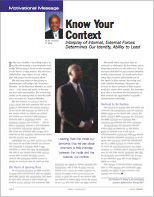Know your context

By identifying the data in our outside world that matters, we are able to make the right choices, choices that ultimately define success or failure for ourselves and for those we lead.
Interplay of Internal, External Forces Determines Our Identity, Ability to Lead
In this issue of Pride, I am asking readers to consider the journey to transformative leadership. This journey is based on the metaphor of safe houses or way stations. Our ancestors utilized these way stations to rest, reflect, plan and prepare for the journey ahead.
The first way station on the journey to transformative leadership is the Conscious Chamber. In the Conscious Chamber, we work to be — to be aware and awake, to develop our inner voice and intuition. Our second way station on the journey takes us from the inside out as we enter the Context Chamber.
We live moment to moment, event to event, acting but often unaware that we are taking in information and making meaning of our world. The meaning we make of all the events around us affects our choices and directs our decisions. The interplay between what is happening inside — our thoughts, feelings and reactions — and all that is happening outside is the foundation of successful leadership. Leading from the inside out demands that we pay close attention to this interplay between the inside and the outside, our context.
Everything we see, hear, touch, feel, smell and sense in our world defines our context. Our challenge is knowing what to pay attention to, when and why. By identifying the data in our outside world that matters, we are able to make the right choices, choices that ultimately define success or failure for ourselves and for those we lead.
The Perils of Ignoring Cues
As African-Americans, we find ourselves in many work environments that are fraught with both danger and opportunity. Our sense of each work context is often framed by outside forces, legacies and structures that challenge our ability to sustain integrity and authenticity. Out of fear of being seen by others as too smart, not smart enough, too direct, too angry or too unreasonable, we ignore or deny the cues in our context that are needed to inform right action. We prefer to not see, hear and know our daily context.
We would rather stay silent than be criticized or challenged. We fear being seen as disgracing ourselves or the entire race. If our ancestors had failed to pay constant attention to their environments, we would not be here today. Our ancestors paid attention to all the signals in their context. Accessing rocksolid, intuitive knowledge, they were able to focus on those elements of their context needed to ensure their survival. Our ancestors were able to transform the circumstances of their context into opportunities to provide transformative leadership.
Destined to Be Leaders
Our journey to leading from the inside out continues. To successfully lead, ask yourself: What’s going on out there? Am I seeing the whole picture? What messages are streaming in? What meaning am I making? Am I accessing my intuition and inner knowing? Understanding the interplay between what’s going on inside of us, and what’s going on outside of us is the key to transformational leadership. The way station of the Context Chamber challenges us to be aware and expansive about the information we let in, while learning to discern where to focus. As African-Americans, our legacy provides us a valuable key in knowing how to care for and lead others. Following this path of leadership, our contribution can be seen in our children’s eyes and in our ability to thrive as a race.
Our destiny of transformative leadership calls us. Our courage and confidence grow through our ability to stay conscious and manage our context.

